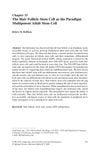 30 citations,
May 2018 in “Experimental Dermatology”
30 citations,
May 2018 in “Experimental Dermatology” The conclusion is that future hair loss treatments should target the root causes of hair thinning, not just promote hair growth.
 14 citations,
September 2018 in “International Journal of Molecular Sciences”
14 citations,
September 2018 in “International Journal of Molecular Sciences” Mackerel-derived fermented fish oil helps hair grow by activating growth pathways and increasing cell proliferation.
[object Object]  4 citations,
February 2022 in “Frontiers in molecular biosciences”
4 citations,
February 2022 in “Frontiers in molecular biosciences” Chronic stress in mice changes skin metabolism and gene expression, leading to hair loss.
 31 citations,
January 2014 in “Clinical Endocrinology”
31 citations,
January 2014 in “Clinical Endocrinology” The study suggests that being overweight or obese, not PCOS itself, is strongly linked to insulin resistance.
 August 2022 in “Case reports”
August 2022 in “Case reports” Isotretinoin effectively treated a rare scalp condition, but careful drug monitoring and a dairy-free diet were important.
 397 citations,
February 2004 in “British Journal of Dermatology”
397 citations,
February 2004 in “British Journal of Dermatology” Minoxidil boosts hair growth by opening potassium channels and increasing cell activity.
 October 2018 in “Springer eBooks”
October 2018 in “Springer eBooks” The document concludes that various hair disorders have different treatments, including medication, surgery, and addressing underlying causes.
 1 citations,
January 2008 in “Springer eBooks”
1 citations,
January 2008 in “Springer eBooks” Hair follicle stem cells can turn into many cell types and may help repair nerve damage and have other medical uses.
2 citations,
May 2022 in “Stem cell research & therapy” Disrupted stem cell signals in hairpoor mice cause hair loss.
 242 citations,
February 2016 in “Science”
242 citations,
February 2016 in “Science” Hair loss and aging are caused by the breakdown of a key protein in hair stem cells.
[object Object]  3 citations,
July 2021 in “Life science alliance”
3 citations,
July 2021 in “Life science alliance” PNKP is essential for keeping adult mouse progenitor cells healthy and growing normally.
 9 citations,
January 2019 in “American Journal of Dermatopathology”
9 citations,
January 2019 in “American Journal of Dermatopathology” DKK-1 gene linked to hair loss in AGA and AA patients; more research needed for potential therapy.
 66 citations,
March 2009 in “British journal of surgery”
66 citations,
March 2009 in “British journal of surgery” Hidradenitis suppurativa treatment should be tailored to the individual, with quitting smoking being important.
Different types of sun exposure damage skin cells and immune cells, with chronic exposure leading to more severe and lasting damage.
105 citations,
October 2017 in “Stem cells” Wnt signaling is crucial for skin development and hair growth.
 July 2024 in “Clinical Cosmetic and Investigational Dermatology”
July 2024 in “Clinical Cosmetic and Investigational Dermatology” Exosomes can help promote hair growth and may treat hair loss.
 2 citations,
March 2021 in “Molecular Immunology”
2 citations,
March 2021 in “Molecular Immunology” Dermal macrophages might help regrow hair.
 March 2024 in “Bioactive Materials”
March 2024 in “Bioactive Materials” New treatment using engineered nanovesicles in hydrogel improves hair growth by repairing hair follicle cells in a mouse model of hair loss.
 188 citations,
October 2012 in “The AAPS Journal”
188 citations,
October 2012 in “The AAPS Journal” The document concludes that developing generic topical drugs requires ensuring they match the original in quality, composition, and structure, and often involves complex testing and regulatory steps.
 November 2024 in “Fermentation”
November 2024 in “Fermentation” Fermented ginsenosides from kimchi bacteria may promote hair growth better than finasteride.
 April 2016 in “Plastic and reconstructive surgery. Global open”
April 2016 in “Plastic and reconstructive surgery. Global open” Surgery may help infants with sagittal craniosynostosis develop more typical language processing.
 179 citations,
April 2012 in “Nature Communications”
179 citations,
April 2012 in “Nature Communications” Regenerated fully functional hair follicles using stem cells, with potential for hair regrowth therapy.
 88 citations,
February 2011 in “Journal of Dermatological Science”
88 citations,
February 2011 in “Journal of Dermatological Science” Minoxidil helps hair growth by activating the β-catenin pathway.
 6 citations,
July 2009 in “Biomolecules & therapeutics”
6 citations,
July 2009 in “Biomolecules & therapeutics” Combining MSM with MAP significantly promotes hair growth.
 288 citations,
June 2009 in “Human reproduction update”
288 citations,
June 2009 in “Human reproduction update” The modified Ferriman-Gallwey method is a useful tool for diagnosing hirsutism.
 9 citations,
July 2020 in “Biomedicine & Pharmacotherapy”
9 citations,
July 2020 in “Biomedicine & Pharmacotherapy” Mitochondrial therapy and platelet-rich plasma therapy both stimulated hair regrowth in aging mice, with mitochondrial therapy showing similar effectiveness to plasma therapy.
 March 2023 in “Clinical, cosmetic and investigational dermatology”
March 2023 in “Clinical, cosmetic and investigational dermatology” IL-33 is linked to hair follicle damage in psoriasis and could be a treatment target for hair loss in this condition.
19 citations,
March 2021 in “Experimental and Therapeutic Medicine” Isotretinoin can cause serious birth defects and needs careful use, especially in pregnant women.
 42 citations,
March 2014 in “European Journal of Pharmacology”
42 citations,
March 2014 in “European Journal of Pharmacology” Ginsenoside F2 from ginseng may increase hair growth better than standard treatments by affecting cell growth signals.
 87 citations,
April 2018 in “Biochemical and Biophysical Research Communications”
87 citations,
April 2018 in “Biochemical and Biophysical Research Communications” Exosomes from dermal papilla cells can help grow hair and might treat hair loss.


























